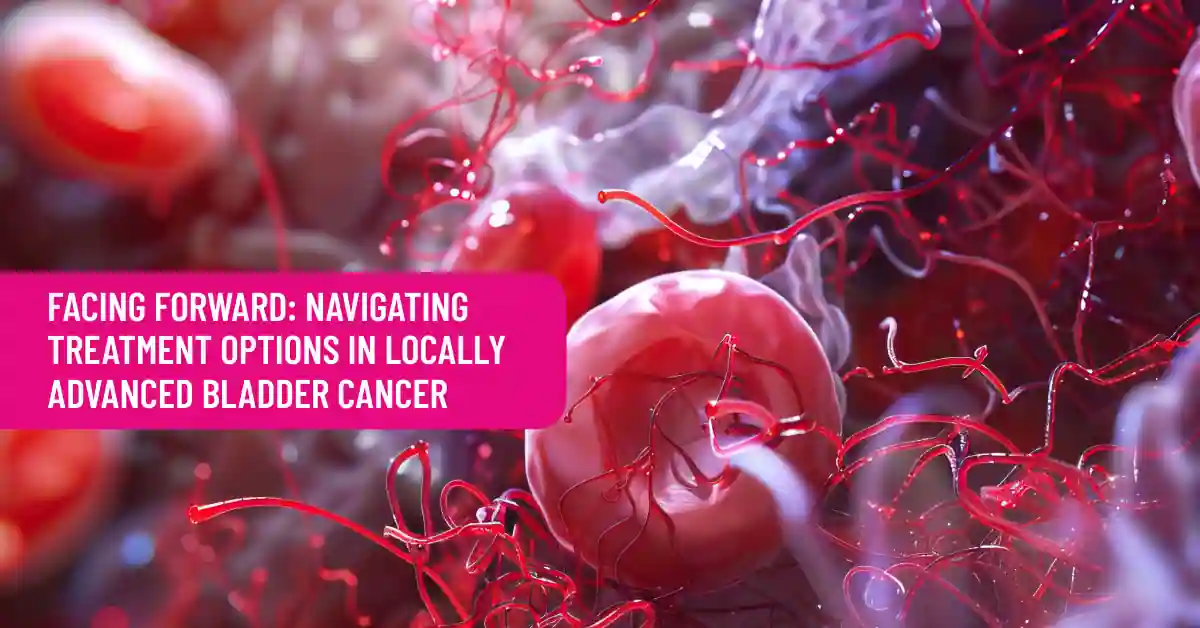As VIPOS 2025 approaches, the spotlight turns to multidisciplinary strategies in tackling one of urologic oncology’s toughest challenges.
Bladder cancer may start small, but in its more advanced stages, it demands bold, complex decisions. Locally advanced bladder cancer refers to disease that has grown into the muscle layer of the bladder wall or surrounding tissues, but hasn’t yet spread widely through the body. It’s a critical stage, where timely, precise treatment can still offer meaningful control, long-term remission, and even cure.
As we move closer to the VS International Precision Oncology Summit (VIPOS) 2025, conversations around locally advanced bladder cancer are more relevant than ever. Oncologists, urologists, radiologists, and patients alike are reevaluating both traditional and cutting-edge options. This blog aims to unpack the current landscape of treatment, making it digestible for both medical professionals and curious lay readers.
1. Radical Cystectomy: Still the Gold Standard
For many patients, surgical removal of the bladder—radical cystectomy—remains the cornerstone of treatment. This involves removing the bladder along with nearby lymph nodes, and in some cases, parts of adjacent organs. A new urinary pathway is then surgically created.
While highly effective in controlling the primary tumor, this is a major operation. Recovery, long-term bladder function, and quality of life are key considerations, which is why pre-surgical counseling and fitness assessments play a vital role.
2. Trimodality Therapy: Bladder Preservation with Precision
Not every patient wants, or is fit for bladder removal. That’s where Trimodality Therapy (TMT) steps in: a combination of limited surgery (TURBT – transurethral resection of bladder tumor), chemotherapy, and precision radiation therapy.
This bladder-preserving approach is gaining ground, especially with improvements in radiation targeting (IMRT, image-guided therapy) and sensitizing chemotherapy. Carefully selected patients can achieve similar outcomes to surgery, all while keeping their bladder intact.
Expect this approach to be a hot topic at VIPOS 2025, especially as quality of life becomes central to oncologic decisions.
3. Neoadjuvant Chemotherapy: Setting the Stage
Before either surgery or radiation, neoadjuvant chemotherapy, typically cisplatin-based combinations, is given to shrink the tumor and address micro-metastatic disease. It’s been shown to improve survival by about 5–8% at 5 years.
For the medical audience: recent interest lies in identifying molecular markers to predict who truly benefits. For non-medical readers: this is essentially prepping the battlefield before the main attack.
4. Immunotherapy: The New Frontier
Checkpoint inhibitors like atezolizumab and nivolumab have entered the bladder cancer space, especially for patients who relapse or cannot receive chemotherapy. Now, trials are exploring their role earlier in the treatment course, both before and after surgery or radiation.
For some patients, the immune system may hold the key to controlling this disease, and combining immunotherapy with standard treatment may be the next leap forward. Look out for VIPOS 2025 sessions focused on bladder cancer immuno-oncology trials and evolving biomarkers like PD-L1.
5. Precision Medicine and Molecular Profiling
Not all bladder cancers behave the same. Advances in genomic testing have revealed molecular subtypes that might respond differently to treatments. This opens the door to individualized therapy, choosing drugs not just based on stage, but on the tumor’s genetic personality.
For clinicians, this means integrating pathology, genomics, and radiology to build patient-specific plans. For patients, it means less guesswork, more personalized decisions.
6. Multidisciplinary Decision-Making: The Power of Teamwork
No single specialist owns the treatment of locally advanced bladder cancer anymore. Successful care now demands a tumor board approach—urologists, radiation oncologists, medical oncologists, pathologists, and radiologists working together.
This is where platforms like VIPOS shine, fostering cross-specialty collaboration and ensuring no treatment decision is made in isolation.
Final Thoughts: A Shift Towards Shared Decision-Making
Locally advanced bladder cancer is a formidable diagnosis, but today’s treatment landscape is rich with options. The choice between bladder removal, preservation, or newer immunotherapies isn’t just medical, it’s deeply personal.
Patients today are more informed, more engaged, and more empowered than ever. As science continues to evolve, the best outcomes will come from aligning medical precision with patient values.
VIPOS 2025 promises to be a landmark event in continuing this dialogue, with a strong focus on bladder cancer, precision oncology, and multi-modal care.
Join us in Chennai this July. Let’s shape the future of bladder cancer care—together.
For updates on the bladder cancer sessions and expert panel discussions at VIPOS 2025, stay tuned to the official agenda.


